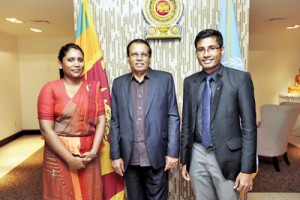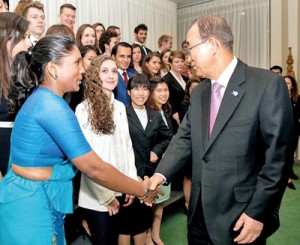Representation for Lankan youth
Sri Lanka’s Official Youth Delegates to the United Nations returned to the country after attending the 70th United Nations General Assembly in New York.

Naushalya Rajapaksha and Thilina Panduwawala, with the President
The National Youth Delegate Programme was hosted and conducted by the National Youth Services Council and drew a 1,000 applicants this year. Candidates were selected by judges representing the ministry, the private sector and civil society.
The selection process was trilingual to remove language barriers in selection and consisted of two rounds of interviews, a public event featuring the final eight candidates and a final interview.
Naushalya Rajapaksha and Thilina Panduwawala, this year’s Youth Delegates recently spoke to the Mirror Magazine about the island wide consultation which preceded their journey to the United Nations and their experiences at the U.N. General Assembly.
Naushalya (22) is pursuing her Attorneys-at-Law examination at Law College and a diploma in world affairs and Master’s Degree in Human Rights at the University of Colombo.
Thilina (21) is an undergraduate in International Relations at the University of London international Programmes at Royal Institute of Colombo.
Youth consultations were conducted across 9 provinces to understand the needs, wants and expectations of the country’s 4.74 million youth and formulate the National Youth Statement on behalf of Sri Lanka.
A report based on the consultations will also be handed over to the National Youth Services Council.
For Naushalya, one of the more sobering moments came from understanding the extent to which resources were centralized to Colombo.
Many of the youth they spoke to lamented about how all roads ultimately led to Colombo –to get anything done, be it education or work, they had to make their way to Colombo as their hometown did not have the facilities.
The lack of public resources to facilitate learning and development were scarce in certain provinces. In Anuradhapura for instance, they were informed that buses are a rarity after 6 while sometimes, buses operate only once every three hours – a hindrance when children need to go for classes, explains Nashalya.
With no proper public spaces, entertainment or youth activities, there is also a strong tendency to seek refuge in illicit activities as a means of distraction.
“With regard to the consultations, common problems were unemployment in the nine provinces consistently,” says Thilina.
He explains that employability and career guidance were recurring themes across the island while many emphasized that they didn’t want jobs to be handed over to them but instead urged for assistance in developing their skills.
“Many people don’t know where they want to get to and how to get there and as a result they get lost in-between,” adds Naushalya.
With little or no counselling or comprehensive sex education, it was also apparent that many issues were swept under the carpets of culture and religion, resulting in teenagers left to flounder amidst adult realities, grappling with issues such as unsafe abortions.
The language barrier was also one which was addressed by many youth. Requests were made for authorities to take cohesive methods to teach Sinhala to Tamil students and Tamil to Sinhala students, to help overcome this barrier, while simultaneously emphasizing on English skills.
There was also a lack of awareness on issues such as climate change. Another outcome of their needs, was not being adequately addressed over the years, was a worrying sense of apathy among the youth of certain provinces.
During their three weeks in New York, Naushalya and Thilina attended the Sustainable Development Goals Summit and were involved in the Third Committee of the 70th Session of the United Nations General Assembly.
They also attended side events centred on themes such as peace and security, gender equality and social entrepreneurship.
Thilina explains that he would like to see the spread of social entrepreneurship, given adequate support by national institutions enabling ease of access to youth keen on making a social impact at a grassroots level.
While Naushalya says that she would be like to see more young female participation in civic engagement. Both are emphatic on the need for more people to apply for next year’s youth delegate programme.
The consultations at home and their experiences abroad have also left their mark on both. “After the consultations, a perception that changed within me is the realization about some of the skills that we take for granted in Colombo,” muses Thilina.
Whether it is something seemingly simple such as public speaking or communicating in English, a skill which is taken for granted amidst urban youth often takes a lifetime to attain for others who may not have grown up with the same privileges.
For Naushalya, the responsibility and gravity of representing one’s country really hit home while at the U.N. “We have all heard about it [diplomacy and representation], but that’s the first time I felt it in my bones,” she explains, “The entire country’s image is in your hands. You can either make it or break it.”


